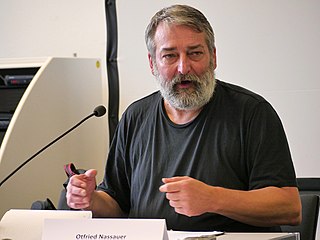
Die Tageszeitung, stylized as die tageszeitung and commonly referred to as taz, is a German daily newspaper. It is run as a cooperative – it is administered by its employees and a co-operative of shareholders who invest in a free independent press, rather than to depend on advertising and paywalls.

Arno Surminski is a German writer, living in Hamburg, a father of three and a grandfather of 8.
Jürgen Jürgens was a German choral conductor and academic teacher. He founded and directed the Monteverdi-Chor Hamburg, a pioneering ensemble for Monteverdi's music.

Iris Hanika is a German writer. She was born in Würzburg, grew up in Bad Königshofen and has lived in Berlin since 1979, where she studied Universal and Comparative Literature at the FU Berlin. She was a regular contributor to German periodicals like Frankfurter Allgemeine Zeitung and Merkur. Hanika won the LiteraTour Nord prize and the EU Prize for Literature for her novel Das Eigentliche. In 2020, she was awarded the Hermann-Hesse-Literaturpreis for her novel Echos Kammern. In 2021, she won the Leipzig Book Fair Prize. Hanika wrote previously mainly short non-fictional texts, later novels, including two books on psychoanalysis.

Constantin Schreiber is a German journalist working for German and Arabic language TV stations.
Ayşe Polat is a German-Kurdish film director, screenwriter and film producer.

#Aufschrei ("outcry") is a German hashtag which went viral on the social media platform Twitter in 2013 with the goal of raising awareness about experiences of sexism in Germany. The Tweets began to appear in response to the publication of an article in which journalist Laura Himmelreich describes an invasive encounter with politician Rainer Brüderle of Germany's Free Democratic Party (FDP); within the German public, these tweets triggered a national debate on sexism, particularly experiences of everyday sexism.

Martin Johannes Sichert is a German merchant and politician (AfD). He has been a member for the 19th Bundestag and was AfD Bavarian state chairman from 2017 to 2019.
Curt Gerhard Westphal, stage name Gert Westphal, was a German-Swiss actor, audiobook narrator, recitator and director, one of the best-known audiobook narrators and speakers in German, described as "König der Vorleser" and "der Caruso der Vorleser". After his reading of her husband's works, Katia Mann called him "des Dichters oberster Mund". The literary critic Marcel Reich-Ranicki said he was probably the best reciter of German.

Diether Dehm is a German singer-songwriter, music producer and left-wing politician. He was a member of the Social Democratic Party of Germany, the PDS, and the Left Party.

Mehringhof is a socialized building complex in Kreuzberg, Berlin, designed as a center for alternative activities. As of 1991, it hosted 38 projects, including a theater, an electronics collective (Wuseltronick), a printing collective, and a school for adults.

Otfried Nassauer was a German journalist and peace researcher, who interacted between civil society, mass media and politics. Over the course of four decades he had a profound impact on the public discourse in Germany and beyond about German and international military policy, especially in the fields of arms control and arms exports.

Julian Reichelt is a German journalist. From February 2017 to October 2021, he was chairman of the editors-in-chief and digital editor-in-chief of Bild, Germany's largest and highest-circulation tabloid.

Postfuhramt, formally known as Kaiserliche Postfuhramt is a historic building built in 1881 and located on Oranienburger Straße at the corner of Tucholskystraße, in the Spandauer Vorstadt area of Mitte, Berlin. Since 1975, it has been a listed as a protected building.
Emilia "Milla" Johanna Fester is a German politician of the Alliance 90/The Greens who has been serving as a Member of the German Bundestag since the 2021 federal election. She has been the youngest member of the German Bundestag before Emily Vontz assumed office.

Ann-Katrin Müller is a German journalist, and the political editor of Der Spiegel. She received an AxelSpringer Prize in Silver in 2018.

Lore Maria Peschel-Gutzeit was a German judge and politician. Born in Hamburg, she became an advocate for family law, children's rights, and gender equality. As the first female president of a family senate, she served as Senator for Justice in Hamburg and Berlin. She implemented key legislation promoting gender equality. Recognized with the Marie Juchacz Women's Prize in 2019, she continued her legal career until her death in Berlin on 2 September 2023, at the age of 90.
Irene Stoehr was a German feminist historical social scientist and journalist. Her main research interests were the feminist movement and gender history in the 20th century.
Antke Engel is a German philosopher and publicist. Together with Sabine Hark, she is one of the pioneers of Butler reception in Germany, teaches as a visiting professor for Queer Studies at various universities and is the founder and director of the Institute for Queer Theory in Berlin.













